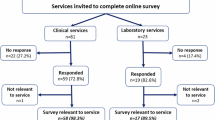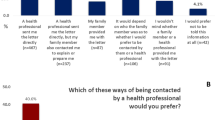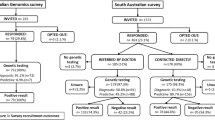Abstract
Patients attending genetic clinics are often the main gatekeepers of information for other family members. There has been much debate about the circumstances under which professionals may have an obligation, or may be permitted, to pass on personal genetic information about their clients but without their consent to other family members. We report findings from the first prospective study investigating the frequency with which genetics professionals become concerned about the failure of clients to pass on such information to their relatives. In all, 12 UK and two Australian regional genetic services reported such cases over 12 months, including details of actions taken by professionals in response to the clients' failure to disclose information. A total of 65 cases of nondisclosure were reported, representing <1% of the genetic clinic consultations in the collaborating centres during the study period. These included 39 cases of the failure of parents not passing full information to their adult offspring, 22 cases where siblings or other relatives were not given information and four cases where information was withheld from partners – including former and prospective partners. Professionals reported clients' reasons for withholding information as complex, more often citing concern and the desire to shield relatives from distress rather than poor family relationships. In most cases, the professionals took further steps to persuade their clients to make a disclosure but in no instance did the professional force a disclosure without the client's consent.
Similar content being viewed by others
Log in or create a free account to read this content
Gain free access to this article, as well as selected content from this journal and more on nature.com
or
References
Berkendorf JL, Reutenaeur JE, Hughes C et al: Patients' attitudes about autonomy and confidentiality in genetic testing for breast-ovarian cancer susceptibility. Am J Med Genet 1997; 73: 296–303.
European Community Huntington's Disease Collaborative Study Group: Ethical and social issues in presymptomatic testing for Huntington's Disease. J Med Genet 1993; 30: 1028–1035.
Wagner Costalas J, Izen M et al: Communication of BrCa1 and BrCa2 results to at-risk relatives: a cancer risk assessment program's experience. Am J Med Genet 2003; 119C: 11–18.
Ormond KE, Mills PL, Lester LA et al: Effect of family history on disclosure patterns of cystic fibrosis carrier status. Am J Med Genet 2003; 119C: 70–77.
Miesfeldt S, Cohn W, Jones S : Breast cancer survivors attitudes about communication of breast cancer risk to their children. Am J Med Genet 2003; 119: 45–50.
Australian Law Reform Commission and Australian Health Ethics Committee. Protection of Human Genetic Information, Issues Paper 26, 2001.
Bell D, Bennett B : Genetic secrets and the family. Med Law Rev 2001; 9: 130–161.
British Medical Association: Human Genetics: Choice and Responsibility. Oxford: Oxford University Press, 1998.
Forrest K, Simpson SA, Wilson BJ et al: To tell or not to tell: barriers and facilitators in family communication about genetic risk. Clin Genet 2003; 64: 317–326.
Wilson BJ, Forrest K, van Teijlingen ER et al: Commentary: family communication about genetic risk: the little that is known. Commun Genet 2004; 7: 15–24.
Skene L : Genetic secrets and the family: a response to Bell and Bennett. Med Law Rev 2001; 9: 162–169.
Tassicker R, Savulescu J, Skene L et al: Prenatal diagnosis requests for Huntington's disease when the father is at risk and does not want to know his genetic status: clinical, legal, and ethical viewpoints. Br Med J 2003; 326: 331–333.
Kessler S : Genetic Counselling–Psychological Aspects. New York: Academic Press, 1979.
Clarke A : Is non-directive genetic counselling possible? Lancet 1991; 338: 998–1001.
Sommerville A, English V : Genetic privacy: orthodoxy or oxymoron? J Med Ethics 1999; 25: 144–150.
Wüstner K : Ethics and practice: two worlds? The example of genetic counselling. New Genet Soc 2003; 22: 61–87.
Claes E, Evers-Kiebooms G, Boogaerts A et al: Communication with close and distant relatives in the context of genetic testing for hereditary breast and ovarian cancer in cancer patients. Am J Med Genet 2003; 116A: 11–19.
Cox SM : ‘It's not a secret but.’ Predictive testing and patterns of communication about genetic information in families at risk for Huntington's disease; Unpublished PhD thesis, University of British Columbia, 1999.
Richards MPM : Annotation: genetic research, family life and clinical practice. J Child Psychol Psychiatr 1998; 39: 291–306.
Skirton H : Telling the children; in Clarke A (ed): The Genetic Testing of Children. Oxford: Bios Scientific Publishers, 1998, pp 103–111.
Duster T : The social consequences of genetic disclosure; in Carson RA, Rothstein MA (eds): Behavioral Genetics: The Clash of Culture and Biology. London: The John Hopkins University Press, 1999, pp 172–188.
Green J, Richards M, Murton F et al: Family communication and genetic counselling: the case of hereditary breast and ovarian cancer. J Genet Counsel 1997; 6: 45–60.
Wright C, Kerzin-Storrar L, Williamson PR, Fryer A, Njindou A : Comparison of genetic services with and without genetic registers; knowledge, adjustment and attitudes about genetic counselling among probands referred to three genetic clinics. J Med Genet 2003; 39: e84.
d'Agincourt-Canning L : Experiences of genetic risk: disclosure and the gendering of responsibility. Bioethics 2001; 15: 231–247.
Sobel S : ‘Do you need to know?’ Genetic testing for Huntington's disease; in: McDaniel S, Hepworh J, Doherty W (eds): The Shared Experience of Illness: Stories of Patients, Families, and Their Therapists. New York: Basic Books, 1997.
Costalis JW, Itzen M, Malick J et al: Communication of BRCA1 and BRCA2 results to at-risk relatives: a cancer risk assessment program's experience. Am J Med Genet 2003; 119C: 11–18.
Featherstone K, Atkinson PA, Clarke AJ : Family and Kinship in the Era of New Genetics, Report to The Wellcome Trust 2003.
Richards MPM : Families, kinship and genetics; in: Marteau T, Richards MPM (eds): The Troubled Helix: Social and Psychological Implications of the New Human Genetics. Cambridge: Cambridge University Press, 1996.
Richards, MPM : Assisted reproduction, genetic technologies and family life; in Scott J, Treas J, Richards MPM (eds): Blackwell Companion to the Sociology of Families. Oxford: Blackwell, 2003.
Hakimian R : Disclosure of Huntington's disease to family members: the dilemma of known but unknowing parties. Genet Test 2000; 4: 359–364.
Royal College of Physicians Committees on Clinical Genetics and Ethical Issues in Medicine. Ethical Issues in Clinical Genetics. London: Royal College Physicians London, 1991.
Human Genetics Society of Australasia: Privacy Implications of Genetic Counselling, March 1999, http://www.hgsa.com.au/.
Brownsword R, Cornish WR, Llewelyn M : Law and Human Genetics: Regulating a Revolution. Oxford: Hart Publishing, 1998.
Laurie G : Legal and Ethical Aspects of Genetic Privacy. Cambridge: Cambridge University Press, 2001.
Human Genetics Commission: Inside Information: Balancing Interests in the Use of Personal Genetic Data. London: Department of Health, 2002.
Gilbar R : Medical confidentiality within the family: the doctor's duty reconsidered. Int J Law, Policy Family 2004; 18: 195–213.
Hughes C : Genetic testing for inherited breast-ovarian cancer susceptibility: the role of communication and personality characteristics; Unpublished PhD thesis, Howard University, United States, 1997.
Ayme S, Macquart-Moulin G, Julian-Reynier C et al: Diffusion of information about genetic risk within families. Neuromuscul Disord 1993; 3: 511–514.
Wertz DC, Fletcher JC : Ethics and medical genetics in the United States: a national survey. Am J Hum Genet 1988; 29: 815–827.
Pencarinha DF, Bell NK, Edwards JG et al: Ethical issues in genetic counseling: a comparison of M.S. counselors and medical geneticist perspectives. J Genet Counselling 1992; 1: 19–30.
Rhodes R : Genetic links, family ties and social bonds: rights and responsibilities in the face of genetic knowledge. J Med Philos 1998; 23: 10–30.
Weijer C : Family duty is more important than rights bmj.com/egi/content/full/321/7274/1464, 2000.
Juengst ET : Genetic testing and the moral dynamics of family life. Public Understanding Sci 1999; 8: 193–205.
Bower MA, Veach PMc, Bartels DM, LeRoy BS : A survey of genetic counselors' strategies for addressing ethical and professional challengs in practice. Genet Counsel 2002; 1: 163–186.
Falk MJ, Dugan RB, D'Riondan MA, Matthews AL, Robin NH : Medical geneticists' duty to warn at-risk relatives for genetic disease. Am J Med Genet 2003; 120A: 374–380.
Dugan RB, Wiesner GL, Juengst ET et al: Duty to warn at-risk relatives for genetic disease: genetic counselors' clinical experience. Am J Med Genet 2003; 119C: 27–34.
Plantinga L, Natowicz MR, Kass NE et al: Disclosure, confidentiality and families: experiences and attitudes of those with genetic versus non-genetic medical conditions. Am J Med Genet 2003; 119C: 51–59.
Manjoney DM, McKegney FP : Individual and family coping with polycystic kidney disease: the harvest of denial. Int J Psychiatr Med 1978; 9: 19–31.
Jolly A, Parsons EP, Clarke AJ : Identifying carriers of balanced chromosomal translocations: interviews with family members; in Clarke AJ (ed): The Genetic Testing of Children. Oxford: Bios Scientific Publishers, 1998, pp 61–90.
Järvinen O, Aalto A-M, Lehesjoki A-E et al: Carrier testing of children for two X linked diseases in a family-based setting: a retrospective long term psychosocial evaluation. J Med Genet 1999; 36: 615–620.
Cox SM, McKellin WH : ‘There's this thing in our family’. Predictive testing and the construction of risk for Huntington's disease. Sociol Health Illness 1999; 21: 622–646.
Downing C : Reproductive decision-making in families at risk from huntington's disease: perceptions of responsibilities; Unpublished PhD thesis, University of Cambridge, 2001.
Huniche L : Huntington's disease in everyday life. Knowledge, ignorance and genetic risk; PhD dissertation Center for Health, Humanity and Culture, Aarhus University, 2002.
France E, Gray J, Elwyn G et al: Genetic testing considerations in breast cancer patients. J Genet Counsel 1999; 8: 289–299.
Hallowell N, Foster C, Eeles R, Ardern-Jones A, Murday V, Watson M : Balancing autonomy and responsibility: the ethics of generating and disclosing genetic information. J Med Ethics 2003; 29: 74–83.
Elwyn G, Gray J, Clarke A : Shared decision making and non-directiveness in genetic counselling. J Med Genet 2000; 37: 135–138.
Offit K, Groeger E, Turner S, Wadsworth EA, Weiser MA : The ‘Duty to Warn’ a Patient's Family Members About Hereditary Disease Risks. J Am Med Assoc 2004; 292: 1469–1473.
Parker M, Lucassen A : Genetic information: a joint account? BMJ 2004; 329: 165–167.
Boddington P : Confidentiality in genetic counselling; in Clarke A (ed): Genetic Counselling: Practice and Principles. London: Routledge, pp 223–240.
Clarke A : Challenges to genetic privacy; in: Harper PA, Clarke AJ (eds): Genetics, Society and Clinical Practice. Oxford: Bios Scientific Publishers, 1997, pp 149–164.
Hallowell N, Green JM, Statham H, Murton F, Richards MPM : Recall of numerical risk estimates and counsellee's perceptions of the importance of risk information following genetic counselling for breast and ovarian cancer. Psychol, Health Med 1997; 2: 149–159.
Richards MPM : Genetic counselling for those with a family history of breast or ovarian cancer. Acta Oncol 1999; 38: 559–565.
Lucassen A, Parker M : Confidentiality and serious harm in genetics – preserving the confidentiality of one patient and preventing harm to relatives. Eur J Hum Geneti 2004; 12: 93–97.
Peterson S, Watts, Koewly L : How families communicate about HNPCC genetic testing: findings from a qualitative study. Am J Med Genet 2003; 119C: 78–86.
Nuffield Council on Bioethics. Genetic Screening: Ethical Issues. London: Nuffield Council on Bioethics, 1993.
American Society of Human Genetics Social Issues Subcommittee on Familial Disclosure: ASHG Statement: professional disclosure of familial genetic information. Am J Hum Genet 1998; 62: 474–483.
Genetic Interest Group: Confidentiality Guidelines. London: Genetic Interest Group, 1998.
General Medical Council: Confidentiality: Protecting and Providing Information. London: General Medical Council, 2000.
Department of Health: Confidentiality: A Code of Practice for NHS Staff (Draft). London: Department of Health, 2002.
Acknowledgements
We thank Drs Oonagh Corrigan and Bryn Williams-Jones for helpful comments on an earlier draft of this paper. This was an unfunded study carried out by clinicians and academic colleagues while they were engaged in their regular professional activities; all the authors thank their many colleagues for the care and trouble they took in providing the data. During this study, Angus Clarke was supported in part by a grant from the Wellcome Trust.
Author information
Authors and Affiliations
Consortia
Corresponding author
Additional information
Collaborators: Ahmad A, West Midlands Regional Clinical Genetics Unit, Birmingham Women's Hospital, Edgbaston, Birmingham B15 2TG, UK.Brennan P, Teesside Genetics Unit, James Cook University Hospital, Marton Rd., Middlesborough TS4 3BW, UK.Lynch SA, formerly Department of Human Genetics, International Centre for Life, Newcastle upon Tyne, UK (now National Centre for Medical Genetics, Our Lady's Hospital for Sick Children, Crumlin, Dublin 12, Eire).Wiles V, Department of Medical Genetics, Addenbrookes NHS Trust, Hills Rd., Cambridge CB2 2QQ, UK.Zukowska-Wilcocks A, Yorkshire Regional Genetic Service, Department of Clinical Genetics, Ashley Wing, St James University Hospital, Leeds LS9 7TF, UK
Rights and permissions
About this article
Cite this article
Clarke, A., Richards, M., Kerzin-Storrar, L. et al. Genetic professionals' reports of nondisclosure of genetic risk information within families. Eur J Hum Genet 13, 556–562 (2005). https://doi.org/10.1038/sj.ejhg.5201394
Received:
Revised:
Accepted:
Published:
Issue date:
DOI: https://doi.org/10.1038/sj.ejhg.5201394
Keywords
This article is cited by
-
In the family: access to, and communication of, familial information in clinical practice
Human Genetics (2022)
-
A genetic researcher’s devil’s dilemma: Warn relatives about their genetic risk or respect confidentiality agreements with research participants?
BMC Medical Ethics (2021)
-
Disclosure to genetic relatives without consent – Australian genetic professionals’ awareness of the health privacy law
BMC Medical Ethics (2020)
-
Communicating genetic information to family members: analysis of consent forms for diagnostic genomic sequencing
European Journal of Human Genetics (2020)
-
Informing relatives at risk of inherited cardiac conditions: experiences and attitudes of healthcare professionals and counselees
European Journal of Human Genetics (2019)



